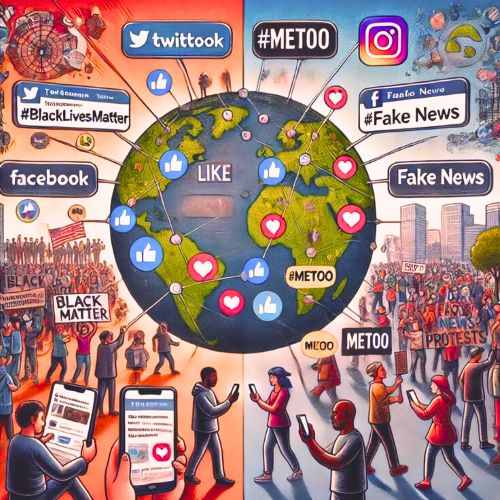Due to the increasing and excessive use of the internet, a new law was made, which is called Cyber Law or Internet Law. These laws help protect individuals’ digital rights and interests, secure organizations operating online, and promote the safe and responsible use of technology, enabling effective electronic communication. In the present era, cyber law addresses various issues, including Intellectual Property Rights (IPR), online privacy, and freedom of expression in the digital age.
However, many people, whether from rural or urban areas, are not familiar with important cyber law facts. Being aware of these laws allows them to use digital platforms like Instagram, Facebook, and Telegram safely.
What is Cyber Law?
Cyber law, also known as digital law or internet law, is a legal framework that regulates online activities and transactions conducted through digital technologies. It also sets some legal restrictions related to spreading information on online resources and the internet.
Main areas under cyber law:
-
-
Cybercrimes – Hacking, identity theft, cyber-attacks, etc.
-
Intellectual Property Rights (IPR) laws – Copyright and trademark.
-
Online privacy and data protection
-
Cyberbullying and digital harassment
-
Digital signatures and electronic records
-
Countries around the world have implemented Cyber Law to protect individuals’ digital rights and ensure the safe use of the internet. Some important cyber laws are as follows:
-
Information Technology Act, 2000 (IT Act) – It was implemented by the Indian Parliament in the year 2000. This is the primary law that regulates cybercrime and electronic commerce, so that digital transactions can be legally operated and cybercrimes can be reduced.
-
Digital Millennium Copyright Act (DMCA Act) – This is a part of the U.S. copyrights laws, which defines the rights and responsibilities of those copyright owners whose content is infringed on the internet. It also defines the responsibilities of internet service providers (ISP) on whose servers infringing content is found.
Cyber Law is stricter than you think
In the digital age, many people spread content on social media without re-verification and underestimate the punitive actions related to Cyber Law and cybercrimes. They take it as a joke and try to challenge Cyber Law, believing that it can’t really cost them much.
For example, in 2023, UK citizen Joseph James O’Connor was sentenced to 5 years in prison for engaging in various cybercrime activities, including hacking the accounts of high-profile social media influencers and stealing cryptocurrency. Such cases make our laws even stricter.
Your social media post can land you in legal trouble
Whatever you share on social media can have legal consequences. If you did not re-verify it before publishing a post, it could land you in legal trouble.
In one important example, two women in India were arrested under Section 66A of the Information Technology Act, 2000, because they posted comments on Facebook that were considered objectionable. Later, the Supreme Court of India struck down Section 66A, but this case highlighted the potential legal consequences of online expression.
Landmark cyber law cases in India that helped enforce Cyber Law more strictly. These proved helpful in defining online expressions and interpreting computer-related terms.
You can be arrested even for viewing or downloading certain content
The internet knows everything, like your name, and you can search anything on the internet. Many sites offer you free content, but sometimes due to unawareness or unknowingly, you may download copyrighted or pirated content from such sites, which can cause you serious legal trouble.
For example, viewing or downloading child pornography in India is completely prohibited. If you view or download such content through any medium, you may fall into serious legal trouble and face heavy fines and several years of imprisonment.
Therefore, be cautious before taking any such step.
Hacking isn’t always illegal
As you all know, accessing someone’s device or data without permission is illegal, which is called hacking. But it’s not illegal every time, because ethical hacking is a legal and rapidly growing profession.
Many organizations hire ethical hackers to identify and fix security flaws in their systems, making the system more secure. Certifications like Certified Ethical Hacker (CEH) validate the skills of professionals in this field.
Do you want to become a certified ethical hacker? Check out this course
Deleted data can also be used against you
As you all know, there is a feature called ‘Incognito Mode’ in the Chrome browser, which provides privacy during internet browsing. But it is not completely secure.
The content viewed in Incognito Mode cannot be completely hidden. If you search or download any such content that is banned by the Government of India, it can be used against you.
Similarly, if you have deleted any data from your device, it can be retrieved using advanced digital forensic techniques and used as legal evidence.
The government can legally monitor your online activities
In special circumstances, the government has the legal right to monitor your online activities, which is often referred to as National Security Concerns (NSC).
Conclusion – Why you should be more cautious online
In this era of digitization, the Internet of Things (IoT) is growing rapidly, so awareness is extremely important before taking any online step. So stay alert and follow these steps before doing anything online:
-
-
Stay informed – Get information about your country’s cyber laws.
-
Think before you post – Re-verify whatever you want to share online to maintain credibility.
-
Use real websites – Avoid unauthorized downloads or getting content from third-party sites.
-
Stay safe and spread awareness about cyber laws so that a secure cyber environment can be created.
By following these steps, individuals can navigate the internet responsibly and protect themselves from legal consequences.

